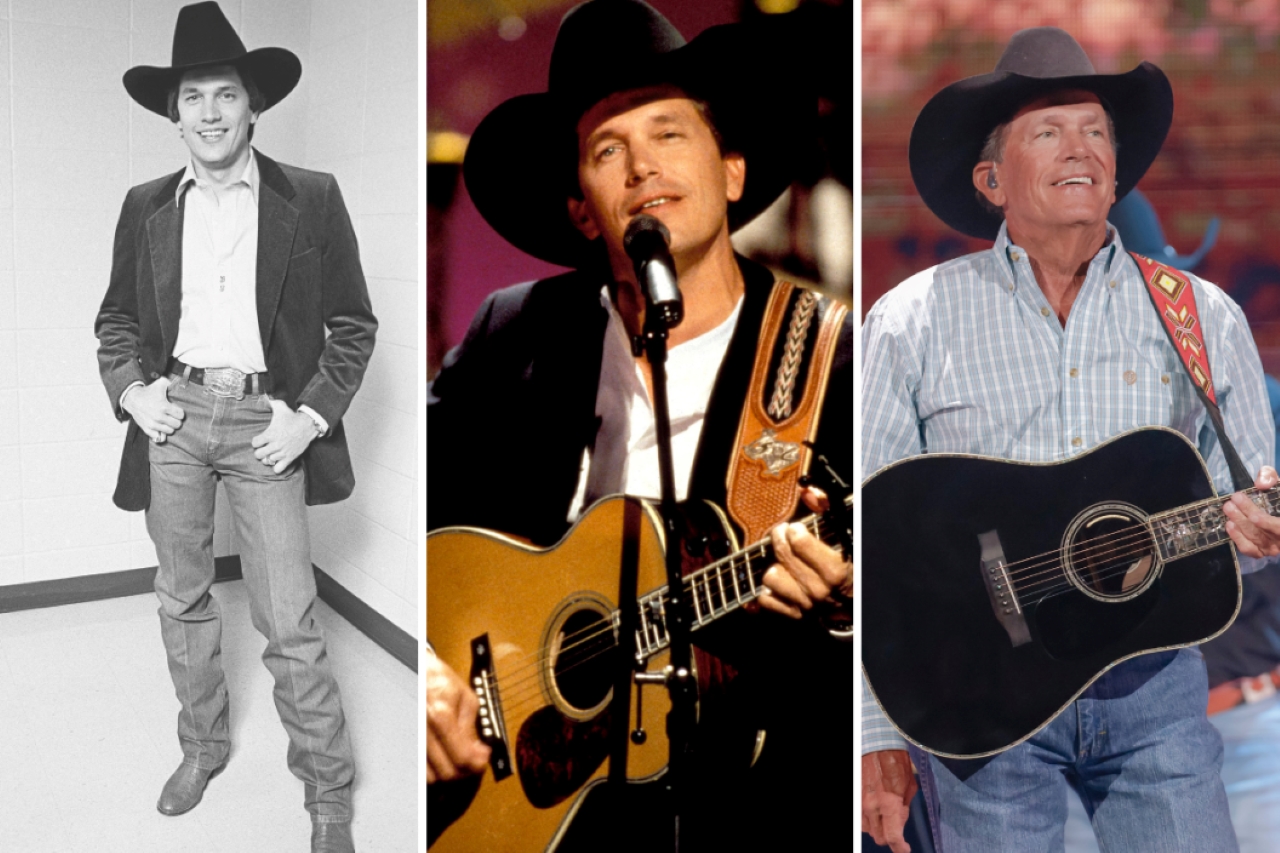🎙️ THE COWBOY WHO WALKED HIS OWN PATH
When people talk about country music royalty, George Strait often tops the list. Yet what’s most surprising about his career isn’t just the string of No. 1 hits or sold-out tours—it’s how he did it without ever moving to Nashville, the very city often deemed essential for success in the country world.
His story is one of quiet rebellion—of a man who didn’t slam doors or burn bridges, but simply chose his own road, paved with authenticity, tradition, and Texas soil.

🧢 THE BEGINNING: FAR FROM MUSIC CITY
Born in Poteet, Texas, and raised in the small town of Pearsall, George Strait was a ranch kid before he was a singer. He joined the Army, got married to his high school sweetheart Norma, and while stationed in Hawaii, he began singing with an Army-sponsored band.
After returning home, Strait earned an agricultural degree at Texas State University and joined a band called Ace in the Hole. For years, they played honky-tonks and roadhouses across Texas, developing a local following. Nashville? That was a distant world, filled with polish, politics, and people who didn’t wear Resistol hats unless they were acting.
He tried once to send demos to Nashville. He was rejected again and again. One label executive famously said he didn’t see a “market for cowboy hats and traditional country anymore.” They couldn’t have been more wrong.
🤠 A CONTRACT THAT CHANGED EVERYTHING
In 1981, MCA Records gave him a small chance—a single song, “Unwound.” If it did well, there might be more. The song shot up the charts, landing Strait in the Top 10. Without ever leaving Texas, without changing who he was, George Strait was suddenly on country radio nationwide.
He released his debut album Strait Country the same year, a record that stayed loyal to honky-tonk roots, Western swing, and simple storytelling. The industry called it “retro.” Fans called it real.
🎯 THE NASHVILLE REFUSAL: WHY HE NEVER LEFT TEXAS
Unlike nearly every other artist chasing the dream, George Strait stayed in Texas. He didn’t move to Music Row. He didn’t play the political game. And when executives asked him to tweak his sound for a more “contemporary” feel, he quietly declined.
He didn’t do interviews often. He didn’t chase trends. He rarely wrote his own songs, choosing instead to serve as a vessel for great songwriters who couldn’t get cuts elsewhere. He was loyal—to his band, his writers, and to the kind of music Nashville had started to forget.
But that refusal to conform didn’t slow him down—it made him iconic.
📈 SUCCESS ON HIS OWN TERMS
By the late 1980s and early 1990s, George Strait had become a phenomenon. He racked up hit after hit: “Amarillo by Morning,” “The Chair,” “All My Ex’s Live in Texas,” “I Cross My Heart.”
In 1992, the film Pure Country—in which he starred—solidified his image as the strong, silent cowboy. The soundtrack became one of the most successful country albums of the decade.
He kept his live shows lean and direct. No dancers. No pyrotechnics. Just a man in a hat, a Telecaster, and a voice that didn’t need embellishment.
By the time he retired from full touring in 2014, he had broken attendance records in stadiums across America. And even then, he still performed occasionally—always in Texas, always on his terms.
👑 THE KING OF COUNTRY, CROWNED WITHOUT COURT POLITICS
George Strait now holds more No. 1 hits than any other artist in country history. Over 60 chart-toppers. More than 100 singles. Dozens of awards. Yet he did it all without ever becoming a “celebrity” in the traditional sense.
He stayed married to the same woman. He kept his personal life private. He didn’t chase endorsements or reality shows. His music did the talking.
In a town like Nashville—where industry events and visibility often matter more than music—Strait’s distance was radical. But fans didn’t care. They came to him.
💔 A PERSONAL LOSS THAT SHAPED HIS PATH
In 1986, Strait’s 13-year-old daughter, Jenifer, died in a car accident. It devastated him. After that, George nearly withdrew from the spotlight completely. He stopped giving interviews. He avoided publicity. He grieved in silence.
But he kept making music. Songs like “Baby Blue” and “You’ll Be There” took on deeper meaning. Fans could feel the sorrow in his voice, even when he didn’t talk about it.
That tragedy may have deepened his need to stay close to home—and far from the artificial glare of the Nashville machine.
🐎 LEGACY: THE MAN WHO MADE NASHVILLE COME TO HIM
George Strait’s career is proof that you don’t have to play the game to win it. By staying true to his roots, by believing in traditional country music when others called it outdated, he reshaped the genre.
Young artists now cite him as a template for how to last in this business. Not by chasing TikTok moments or trend cycles—but by being unshakably yourself.
He didn’t just sing about cowboys—he lived like one. And in the end, Nashville came to him, crown in hand.